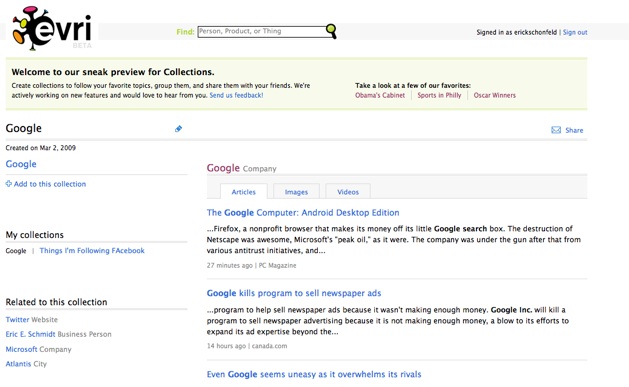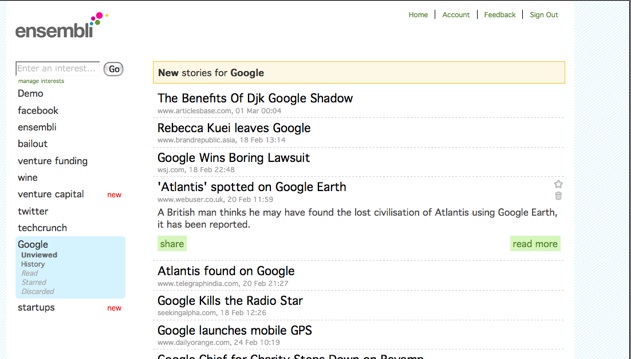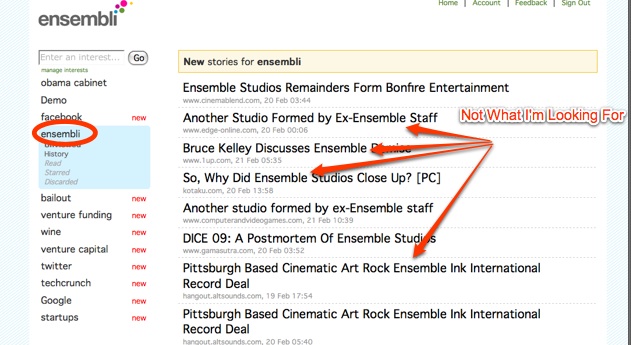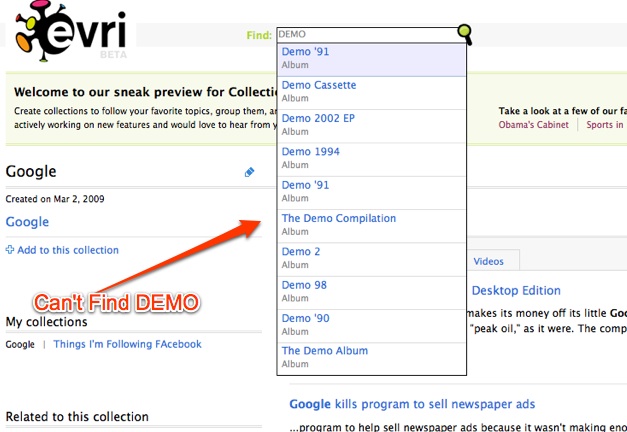At this week’s DEMO conference, two products are launching that are aim to make memetracking easier for everyone. The first one is UK-based Ensembli, which lets users enter any keyword, and it returns articles about that topic. The second is a new feature from semantic search engine Evri called “Collections” which lets you follow any term that it has categorized. Both are new twists on an old idea: prospective search. (You enter a company name or topic and any time a new article about that subject appears, it populates a custom feed to track that meme). I’ve tried out both, and compare my experiences below.
Neither one was as comprehensive or up to date as they should be. Searches for news about major companies such as Google or Facebook missed headlines that other memetrackers such as Techmeme do a better job of capturing. But both have merits as prospective search tools and are examples of how search is increasingly becoming more of a navigational tool.
Evri’s Collections feature lets you “follow” any concept that the semantic search engine has categorized. The Collection page brings up not only recent articles, but also images and videos for the topic you are tracking. It also provides a handy list of related topics and concepts. For instance, my “Google” collection offers links on the side to “Eric Schmidt,” “Twitter,” “Microsoft,” and the lost city of “Atlantis.”
Evri’s collections pages are basically saved searches, with different entry points to navigate to other entries on Evri and across the Web. Topics can be merged in the same collection, so you can follow Google and Facebook on the same page. For some reason, Evri chose to show only the latest three articles for each topic, which is much too limited. It certainly doesn’t capture all the news you’d want to see. And if Evri’s semantic search engine has not categorized what you want to track, you are out of luck. For example, it doesn’t recognize the DEMO conference as a separate topic.

Ensembli, in contrast, provides a much simpler interface. Once you sign up, you type in the topic you want to track, and then Ensembli uses artificial intelligence software to generate a feed of articles about that keyword. The fed updates as new articles appear. You can follow as many topics as you want, but there is no way to browse topics or find related topics. You are presented with a blank search box and either know what you want to track or you don’t. Each headline can be expanded to provide a summary of the article, and you can share each headline, but only via e-mail.

When you click through to a story, you can also share it directly via an Esnembli toolbar at the top. (You are actually sent to an Ensembli link which frames the underlying Webpage, much in the same way Ginx and Digg’s upcoming toolbar present shared pages). Integration with Twitter, Facebook, Friendfeed, and other social sharing services is sorely lacking.
I have a few other issues with Ensembli as well. There is no way to combine topics into a single feed. You have to click on each term you are following to see the respective headlines. There is no way to see them all together. The biggest weakness, however, is that the headlines are not always as comprehensive or up to date as they should be. For instance, tracking “Google” turns up one article from yesterday as the most recent one, and then before that is an article from February 18. There are enough things going on at Google and enough coverage that Ensembli should be able to produce multiple headlines every day. Finally, Ensembli even had trouble identifying articles about itself. (I got a bunch of articles about “ensembles,” a forgivable error, but you’d think the startup would have at least properly categorized itself).
All in all, Evri wins this faceoff.

